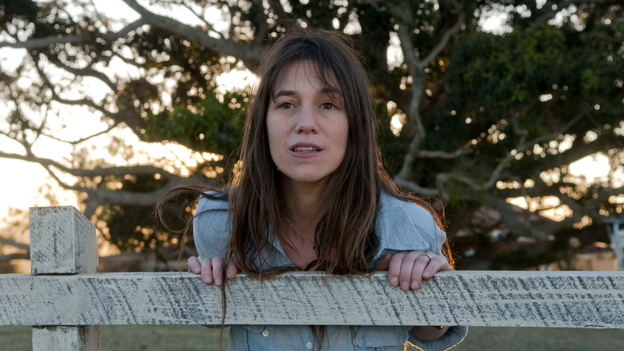The Tree
Somebody Get a Chainsaw, Fast

Starring: Charlotte Gainsbourg, Morgana Davies
Review written by Robert Patrick
“The Tree” is offensive. Not even Green Peace people would care if this wooden stake was unearthed from the ground. This movie is a malady, deserving of every acrid spitball fired at its indulgent limbs. It’s hard to sheath my anger when speaking of “The Tree.” Dumb comedies can be lacquered with a jelly glaze of wonted mischief and stupidity that, even if it doesn’t agree with your sense of humor, you can understand how other people can get a good belly-goof out of it. If a comedy is bad, it doesn’t offend me. If a drama is bad, typically, it doesn’t offend me. If your movie is a sexist hunk of sizzling fat that has been dolled up as a introspective and lyrical piece of moviemaking – well, I’m not raking my tolerance over those coals. Director Julie Bertuccelli – a woman – has constructed a movie that acts like a falling chandelier upon the collective heads of women everywhere. Her movie, based upon a book called “Our Father Who Art in the Tree,” revolves, quite insipidly, around Dawn, a woman who moves to the desolate landscape of the outback, children in tow, only to find that, shortly after the family’s move, her husband dies of a heart attack. Charlotte Gainsbourg, who plays the grieving woman, is the perfect candidate to play the emotionally bleak protaganist (the lines of her face echo the rural sensibilities of her new foreboding, chalky home).
After her husband dies, the children of the household, specifically Simone (Morgana Davies), have a difficult time coping with their new life. Simone takes refuge under the whispering leafs of a giant fig tree – planted sometime in the late 1800s, we’re told – that resides outside of her home. The tree (there’s the title of the movie again, because, if you hadn’t noticed by now, it’s important to the characters) ends up being an emotional figurehead for Simone; she begins to think, by assigning emotions to the monolithic stick in the ground, that it is her late father. Even Dawn begins to believe, for awhile anyway, that the fig tree is of some cosmic, spectral importance. Meanwhile, Dawn, because she is a woman, the movie seems to tell us, cannot fix a broken toilet or handle the idea of a flying bat – until a man comes along, that is, and fixes everything. She meets a plumber, scruffy and resourceful, who mends her, almost immediately, and tells her that everything will be alright. Testosterone and a toolbox is the Swiss army knife for life’s problems, I guess. When Dawn begins to find comfort in herself, the tree, vengeful, we’re to believe, molts a limb and lets its branch, literally, come crashing down into Dawn’s bed, making the statement that, as a woman, she cant be liberated, sexually or otherwise, unless an outside entity allows her to be – and this tree does not want anyone in her Posturepedic.
Later in the film – and I cant possibly spoil the movie as it was already curdled in pre-production – the tree, because of a tornado, is ripped from its roots and flung at Dawn’s home. Because of this, she can find closure in her husband’s death and moves away. Couldn’t she have cut the tree down? Or moved away before the metaphorical trunk blasted through her doors? Of course not; Dawn cannot find the strength to move past her husband’s death by herself. She needs a greater force, outside of her control, to do it for her. I can find all sorts of problems, outside of the ones that I have mentioned, that would torpedo the film (horrendous pacing, inane dialogue, horrendous pacing) but the ones I highlighted are most atrocious. If this movie is about nature, it’s only about the nature of people not being able to find anything, other than weeping and needing assistance, for a woman to do in a film. This film merits not a word more.
